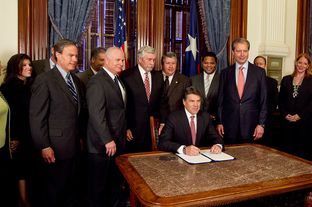In the midst of the worst drought in recent memory, Texas lawmakers two years ago sent the state a message: The need for water can transcend politics.
A coalition of lawmakers from both parties and nearly every corner of the state came together to create a new fund that would help jumpstart water projects like pipelines and treatment plants. A few months later, voters overwhelmingly approved taking $2 billion from the state surplus to get the fund going.
But such a political confluence is rare and not likely to recur soon, many lawmakers and experts say. And as the Legislature takes up more contentious water issues in 2015, including a patchwork system for managing groundwater, water politics may revert back to something more akin to Friday night football.
At least, that's how state Rep. Lyle Larson likes to describe water politics in Texas — thirsty towns in fierce fights over the same water supplies. The divides are often between urban, rural and suburban areas; rainy East Texas and the drier West; or population centers sharing rivers that cross nearly the entire state, like theColorado or Brazos.
"A number of groups have already pulled their swords out, and they’re drawing lines in the sand," said Larson, one of the loudest House members on water issues. "And this is typical of what we’ve seen for the past few decades.” As a San Antonio Republican and former city councilman, Larson himself is an example of locally driven water politics. The exploding city has long sought to buy groundwater from underneath nearby rural communities, but was rebuffed and onlyrecently found a source almost 150 miles away. Larson said cities aren't able to get the water they need because dozens of local districts regulate groundwater differently across Texas, and that the state should have more authority over them.
Doug Miller, a Republican state representative from New Braunfels — less than an hour north of San Antonio — has a different view. Also a vocal House member on water policy, Miller called the need for more state authority over groundwater "a subject for debate."
Miller's constituents include some rural areas that compete with San Antonio for water from the dwindling Edwards Aquifer, and others who fear thirsty cities are after their groundwater. He said it's important "not [to] destroy the economy of rural areas."
The political dynamic got more interesting when Lt. Gov. Dan Patrick shook up the Senate committees and created an Agriculture, Water and Rural Affairs Committee, chaired by freshman Republican Charles Perry of Lubbock. Previously, water had been under the Senate Natural Resources Committee, which Patrick has now put in charge of economic development. Troy Fraser, R-Horseshoe Bay, who chairs that committee, said he expects Perry's committee to take over most groundwater regulation issues.
Such a change is "huge," said Greg Ellis, a lawyer who represents local groundwater regulators across the state. "This move is potentially bad for or negative for cities, water marketers and other people that want to move water from rural Texas into the cities," he said. Perry declined to comment for this story.
It's not yet clear who the drivers of water policy will be in the House, since the former chairman of the House Committee on Natural Resources, Allan Ritter of Nederland, has retired. The Republican was well respected for his relative neutrality when it came to local water battles — perhaps easier for Ritter because his district is in rainy and swampy East Texas, which isn't scrambling for new water supplies.
"Allan did a good job in that respect," said Larson, who — along with Miller — has been vocal in his desire to take over as chairman. Larson added that if the next chairman is "somebody from the rural areas, they might not be as responsive to where we're seeing the compression on [water needs] in the urban areas."
But state Rep. Drew Darby, a Republican from San Angelo, said his West Texas, mainly rural constituents need water just as much as the big cities. Urban representatives may outnumber the rural ones in the Legislature, he said, but “they don’t grow cotton at Men’s Warehouse in San Antonio. They don’t feed beef at the H-E-B in San Antonio. ... The food, the fiber, the natural resources are produced in rural Texas." They need water to do that, Darby said.
There may be a few things that lawmakers come to a consensus on. The Texas Water Conservation Association, one of the largest trade associations of water interests in the state, is making it a priority to speed up applications for surface water projects and encourage underground water storage technologies. Both issues are important for developing big new water supplies for large numbers of people.
But the group — which includes cities, groundwater regulators and others — could not agree on legislation on brackish groundwater desalination, which lawmakers statewide have touted as a major solution to Texas’ water crisis. Urban interests want to make it easier to pump groundwater if it's brackish, and want the ability to appeal to the state if local regulators get in the way. But rural interests see that as a threat to local control over water.
Andy Sansom, executive director of the Meadows Center for Water and the Environment at Texas State University, doesn't expect any of the major water policy issues — namely, groundwater regulation — to be solved without "a catastrophe or federal litigation."
And during this legislative session in particular, many will be tired of dealing with water, Sansom predicted. "There are people who'll say, 'Well, shit, we threw $2 billion at this. What do you want?'"






